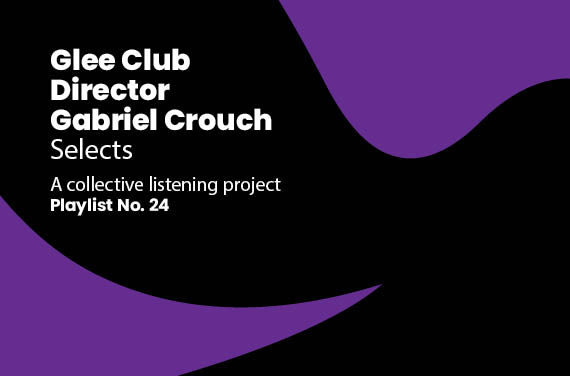Welcome to our 2024-2025 season!
Collective Listening Project
Glee Club Director Gabriel Crouch Selects
Playlist No. 24
About the Playlist
August 20, 2020

There is something about the end of summer that always prompts a bit of nostalgia. Even during these difficult months, as William Carlos Williams wrote, “In summer, the song sings itself.” And so for this week’s Collective Listening Project playlist, it felt appropriate to take a trip down memory lane with Gabriel Crouch, the Department of Music’s Director of Choirs and a beloved programming partner. As a member of the extraordinary vocal ensemble Gallicantus, Gabriel was a part of our very first Performances Up Close concert; with the amazing choir Tenebrae, he helped transform the Princeton University Chapel on multiple occasions into an ethereal musical embrace; and he brought his students in the Princeton University Glee Club to share the stage with several of our visiting artists, including conductor Gustavo Dudamel, vocalist Bobby McFerrin, and most recently last fall with violinist Stefan Jackiw, and pianist Jeremy Denk.
The sadness of being unable to make one’s own music over the last few months has been tempered by the opportunity to listen more closely to what others have done—and to discover that I love the field I work in even more than I thought I did. Here are some recordings that have inspired repeated listening in the last few months.
Heinavanker: Songs of Olden Times
I became a musician because I love the feeling of singing with other people and of making my sound “work” with someone else’s. The idea of blend between singers is often approached in Western choral foundations by denaturing the individual colors of the voice to the furthest extent possible: less blend, more bland. But the kaleidoscopic color range in Heinavanker’s sound is achieved by a much more courageous approach—one which celebrates the grit, the metallic edge, and the warm breath in the human voice rather than filtering it away, and which somehow finds musical nuance within the vowels of the beautiful Estonian language. For all the preponderance of gorgeous choral singing in the Baltic states today, this is the group which captivates me the most. Runic songs and folk hymns set in unpretentious arrangements, many of which have never been notated. For an instant sonic balm, try the ravishing “Mu mano tulge latse,” but then listen to the whole thing!
Wynton Marsalis: Abyssinian Mass, Jazz At Lincoln Center Orchestra with Wynton Marsalis
Wynton Marsalis composed his Gospel Mass “Abyssinian 200—A Gospel Celebration” for the 200th anniversary of the Abyssinian Baptist Church in Harlem in 2008—the worship community which began in 1808 in Lower Manhattan as a group of Ethiopian sailors and African American Baptists, who broke off from the First Baptist Church on Gold Street in protest at the church’s policy of racially segregated seating, and which has since become one of the great centers for church singing in the U.S. Marsalis acknowledges the influence of childhood experiences with his mother at St. Francis Catholic Church in his hometown of New Orleans—but there is a dazzling miscellany of musical styles and voices in the whole piece, which stretches to a full double album: Big band dance grooves, New Orleans dirges and struts, gospel hymns, call and response. The work has been little heard in the U.S. in the last decade, but the recording made by the artists who first staged the work—The Jazz at Lincoln Center Orchestra with Wynton Marsalis and Chorale le Chateau directed by Damien Sneed—brings what must have been an unforgettable set of debut performances to vivid life. If you only have a few minutes, have a listen to the recessional “The Glory Train”—a fabulous example of a Train Song, complete with slowly accelerating clickety-clack percussion and wailing sirens from chorused saxophones, all in the service of an apocalyptic text full of visions of the saints and apostles on the judgment day.
Roxanna Panufnik: Westminster Mass, Westminster Cathedral Choir
I hope you’ll pardon the urge to include something from the tradition I grew up in. Westminster Cathedral, the mother church of the Catholic faith in the U.K., was just down Victoria Street from Westminster Abbey, where I sang and studied from the age of 8 to 13. Its choir has for years been one of the absolute best of its kind, somehow eliciting a musical maturity from the boy trebles that I hesitate to believe I was capable of at that age. Roxanna Panufnik’s Westminster Mass for choir and chamber orchestra, dedicated to the institution, draws on the choir’s full expressive range and musical chops and established Panufnik as one of the best composers of large-scale liturgical music to come out of the U.K. in the last quarter century. Start with the voluptuous Kyrie and enjoy all the delicious major/minor tensions (a big feature of this piece)—but don’t stop there!
The Crossing: Seven Responses
The Philadelphia-based choir The Crossing is dedicated to new music and has earned its reputation as the most enterprising and thoughtful commissioner of choral works in the country. For its Seven Responses project, the choir deployed a well used device of commissioning musical “responses” to well known repertoire, but the combination of old and new is especially captivating here. The preexisting work is Dietrich Buxtehude’s achingly beautiful meditation on the suffering of Christ Membra Jesu Nostri, and the responses are written by seven composers with diverse styles but with common interests in works with political or social themes. Caroline Shaw’s wonderful “To the hands” has become the most famous of this new collection and with good reason; but I especially adore the first three movements of the late Danish composer Pelle Gudmundsen-Holmgreen’s “Ad Cor,” which are then combined together to form a gloriously chaotic fourth movement, in which the three previous movements cheerfully compete with each other for attention.
Cipriano de Rore: Missa Praeter Rerum Seriem, The Tallis Scholars
Josquin des Prez. You know the name I’m sure: the great figure of the early Renaissance, who cast a long shadow over the musicians of the generation to follow—the so-called High Renaissance dominated by Palestrina, Lassus, and Tallis. Even in the mid-sixteenth century, there seems to have existed the belief that certain of Josquin’s text-settings were “definitive”—so firmly imprinted were they in the collective musical conscience that anyone who subsequently approached the text could only do so with direct reference to the old master, with Josquin’s music open in front of the composer, as both inspiration and deterrent. His setting of the text Praeter rerum seriem (“Beyond the natural order of things”—a reference to the Virgin Birth) is perhaps the supreme example of this—it was so eagerly received around Europe that it has survived in no fewer than 50 source manuscripts. In the century that followed its composition, I’ve found works by six composers which set this text and melody, four of whom repurpose entire chunks of the Josquin motet. One of them is a masterpiece in its own right—Cipriano de Rore’s Missa Praeter Rerum Seriem. De Rore spent his most productive years in Ferrara in the employment of Duke Hercules the Second, and it was for a huge mass written in praise of his patron that he decided to conjure up the spirit of Josquin. The original motet is easily recognizable in the Mass, especially in the opening section of each movement, but de Rore adds a new level of embellishment with a seventh voice where Josquin uses only six; and the effect is ravishing. There are lovely recordings of the work by the Gabrieli Choir, the Huelgas Ensemble, and the Tallis Scholars. The latter gives us the precious chance to hear the work immediately after Josquin’s original.
Some other musical consolations of isolation in the last few months:
Two Instagram Live shows by British musician James Blake. So many of these shows in the early days of lockdown fell flat for me, but the incredible intimacy of the setting for Blake’s shows, with the camera pointing up at his face from the piano keys as he chatted amiably and played and sang beautifully, just worked for me. His performance of Don McLean’s “Vincent”—the penultimate song in this set—left me helplessly weeping.
Belatedly discovering the voice of Donny Hathaway. Thanks to my wife Christie for playing “A song for you” one chilly morning in March. I haven’t been the same since.
Robert Hollingworth’s potent insights and bizarre jokes in his YouTube series, Sing the Score. Robert is the founder and director of the vocal consort I Fagiolini, and his Friday broadcasts have become a weekly point of contact for many of us, helping to unpick the mysterious codes of secular Renaissance music and make it more accessible for students, with frequent insertions of Pythonesque humor. I’m genuinely sad at the thought that these might end one day…



